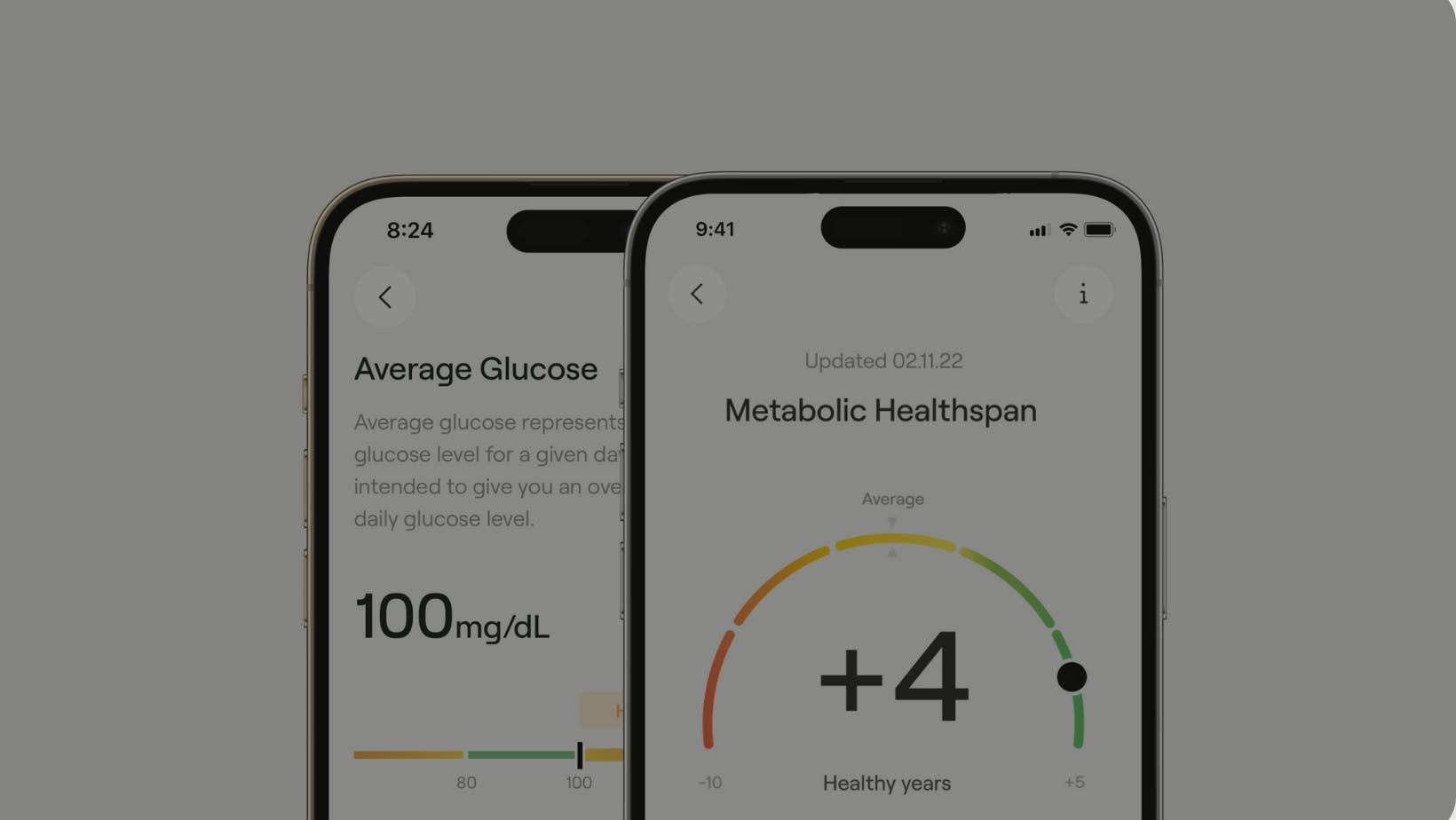Longevity, or long life, is often seen as a marker of health. But that’s not always the case. Even though lifespan has doubled in the past 100 years, more than 290 million Americans are actually metabolically unhealthy and spend years of their life battling disease and pain [1].
In recent years, healthspan has emerged as a more holistic way of looking at our well-being. But what exactly is healthspan, and how does it differ from lifespan?
Healthspan vs. lifespan: what's the difference?
Lifespan is the number of years a human can live. The maximum human lifespan is based on the latest recorded examples — currently, it’s 122 years old [2].
Sometimes, you’ll see the terms lifespan and life expectancy used interchangeably, but there’s an important distinction: unlike lifespan, which shows the greatest possible number of years someone can live, life expectancy is an average that weighs in factors like your diet, where you live, your lifestyle (i.e., exercise habits, alcohol consumption, and smoking), your sex, and your genetics [3].
One of the most important achievements of modern medicine is the increase in human life expectancy, which has more than doubled between 1920 and 2020 [4]. This is primarily due to reduced child mortality rates, thanks to improved treatments for diseases, skilled delivery at birth, and an understanding of hygiene.
While this increase is extraordinary, there are still significant gaps in what lifespan and life expectancy can tell us. For example, they don’t take into account a person’s quality of life, or how many years are spent facing discomfort, loss of independence, and chronic diseases such as cardiovascular diseases, type 2 diabetes, and dementia.
That’s where healthspan comes in.
Healthspan is the number of years a person spends in good health, free from disease, pain, and illness. It measures your physical and mental comfort and your ability to enjoy a healthy life, as opposed to simply the duration of your life. And unlike lifespan, the goal of improving your healthspan is to empower you to be mentally and physically capable of doing the things you love, for longer — especially as you age.
Why healthspan is just as important as lifespan
As lifespan and life expectancy continue to increase, the U.S. is seeing an increase in its older populations — the number of people 65 and older is expected to more than double by 2060 and even outnumber children for the first time ever [5].
This isn’t an isolated trend: globally, the population of people over 60 will increase from 1 billion to 1.4 billion by 2030, and 2.1 billion by 2050 [6]. It’s not just happening in high-income countries either — every country in the world is experiencing this change.
At the same time, we’re experiencing an unprecedented metabolic crisis that’s only expected to get worse.
One out of every three Americans experiences metabolic syndrome, meaning they fall outside of the healthy range for at least 3 of the 5 markers of metabolic health (waist circumference, fasting blood glucose, systolic blood pressure, triglycerides, and HDL cholesterol) [7]. Metabolic syndrome comes with a significantly increased risk of serious health problems like heart disease, stroke, and diabetes — all of which can negatively affect your quality of life.
And it’s not just the U.S. that’s experiencing these trends: worldwide obesity has tripled since 1975 [9]. One in 10 adults (537 million individuals) were living with diabetes as of 2021, and this number is predicted to climb to 783 million by 2045 [10].
In other words, our lifespan may have increased, but our healthspan shows no sign of improving. We’re living longer than we ever have but spending a significant portion of our lived years in poor health, unable to enjoy a life free from discomfort and ailments. Of course, this isn’t always by choice. In many cases, we may lack the education and tools to understand our bodies and feel powerless to take control of our health.
What role does glucose play in healthspan?
The best way to improve your healthspan is by protecting your health early on. Our healthcare system is structured in a way where people are typically only treated for diseases like type 2 diabetes after they’ve been diagnosed as pre-diabetic or diabetic, which makes it challenging to take preventive measures and understand where they fall on the metabolic health spectrum.
The issue is that it’s often hard to know when your metabolic health is on the decline. Looking at your weight or BMI alone isn’t an accurate indicator of your metabolic health, and the symptoms are sometimes unnoticeable or surprising.
This is where glucose — and glucose monitoring — fit into the picture. Stable blood glucose levels play a critical role in healthspan and overall well-being, and knowing your daily levels provides a window into your metabolic health.
Glucose, insulin, and variability
Glucose is a simple sugar found in the foods you eat. It’s also your body’s preferred source of energy.
When you eat carbohydrates, your body breaks them down into glucose during digestion, which it then circulates through the bloodstream so that cells can take it in and transform it into energy. Insulin is the hormone that opens your cells up so they can use glucose.
Your glucose levels naturally rise and fall throughout the day, and your body has tightly controlled mechanisms to ensure they stay within a healthy range. But consistently eating foods that spike your blood sugar (refined carbohydrates), living a sedentary lifestyle, experiencing chronic stress, and having poor sleep hygiene can all throw these mechanisms out of whack — eventually leading to impaired insulin sensitivity or even insulin resistance, a condition where your cells stop responding to insulin. Insulin resistance is linked to type 2 diabetes, fatty liver disease, weight gain, fatigue, mood swings, infertility, and many other conditions that can negatively affect your healthspan.
A CGM can show you real-time data about your glucose levels and variability (fluctuations) — in often surprising and unexpected ways. No other tool that measures your glucose levels (such as an A1C test) can provide the same level of data and empower you to connect the dots between your blood glucose and both your diet and lifestyle.
Key takeaways: how to improve your healthspan
Though many factors can affect your healthspan, the four main pillars to focus on are nutrition, exercise, sleep, and stress management.
You can improve your healthspan by making specific changes to your lifestyle in each of these four areas:
- Nutrition. What you eat — and when you eat — are foundational to your metabolic health and a meaningful ways to improve healthspan. Eating plenty of colorful, fiber-rich fruits and vegetables, avoiding refined carbohydrates and processed foods, and eating within designated windows (i.e., avoiding late-night meals and practicing time-restricted eating) are all associated with improved health.
- Exercise. A sedentary lifestyle is strongly associated with insulin resistance, obesity, risk of cancer, musculoskeletal disorders, depression, and even death [11]. Doing at least 2.5 hours a week of moderate-intensity exercise, including both resistance training and aerobic workouts, can improve your insulin sensitivity and overall health.
- Sleep. Poor sleep hygiene (an irregular schedule and lack of sleep) can significantly impair glucose regulation. It can also lead to obesity, heart disease, high blood pressure, and more [12]. Developing a consistent schedule, getting sunlight after waking up, and avoiding late-night snacking can improve your sleep quality.
- Stress management. Stress is essential to survival, but too much stress over a long period of time keeps your cortisol levels high — which can reduce your insulin sensitivity and increase your risk of heart disease, weight gain, and cognitive impairment [13]. Breathwork, spending time in nature, and exercise are key ways to manage your stress levels.
That said, every body is different. While you can incorporate some of the tips above, not all of these recommendations will work for everyone. At the end of the day, improving your healthspan is a personal process that hinges heavily on your unique biology and experimentation. The best way to understand how your body responds to your diet, workouts, sleep habits, and stress levels is by using a continuous glucose monitor that gives you real-time data on your glucose levels so you can make informed lifestyle shifts.
Veri takes this one step further by providing the guidance and context you need to take action on your CGM data. This includes your Metabolic Healthspan, a first-of-its-kind metric that shows you exactly where you are on the spectrum of metabolic health. Co-developed with Metabolic Health experts from institutions like Harvard, Stanford, and the American Diabetes Association, this feature allows you to understand how foods and habits choices today add up to big health outcomes tomorrow.
References:
- https://www.liebertpub.com/doi/10.1089/met.2018.0105
- https://gero.usc.edu/cga/superagers/the-worlds-longest-lived/
- https://www.verywellhealth.com/what-is-the-human-life-span-2223929
- https://www.mckinsey.com/featured-insights/sustainable-inclusive-growth/chart-of-the-day/life-expectancy-more-than-doubled-over-the-past-century
- https://hms.harvard.edu/news/life-span-health-span
- https://www.who.int/news-room/fact-sheets/detail/ageing-and-health
- https://www.nhlbi.nih.gov/health/metabolic-syndrome
- https://www.liebertpub.com/doi/10.1089/met.2018.0105
- https://www.who.int/news-room/fact-sheets/detail/obesity-and-overweight
- https://diabetesatlas.org/
- https://www.ncbi.nlm.nih.gov/pmc/articles/PMC7700832/
- https://www.nhlbi.nih.gov/health/sleep-deprivation
- https://www.mayoclinic.org/healthy-lifestyle/stress-management/in-depth/stress/art-20046037


